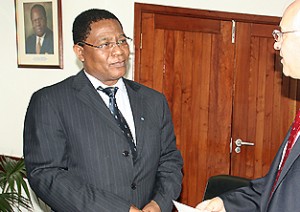Arabian Business | 15 April 2010
by Joanne Bladd The head of a 19-state African trading bloc has denied the Gulf’s policy of snapping up cheap farmland across the continent is tantamount to a ‘neo-colonialist’ land grab. Sindiso Ngwenya, secretary general of Comesa, which counts Kenya, Egypt, Sudan and Madagascar among its members, said multimillion-dollar land deals aimed at securing the Gulf’s food supply provide crucial capital to overhaul poverty-stricken rural areas and build infrastructure. “There is concern that Africa is experiencing new neo-colonialism from Gulf investors and that their only interest is in exploiting Africa’s natural resources,” he told delegates at the third Comesa Investment Forum in Egypt. “For the first time, these countries are receiving significant investment and help with infrastructure. This is a win-win partnership.” According to the International Food Policy Research Institute, up to 20 million hectares of farmland has been offered up to foreign buyers since 2006, at a value of up to $30bn. Saudi Arabia is one of the biggest buyers of agricultural land, followed by the UAE, Qatar, Bahrain, Kuwait and Libya. All are reliant on massive food imports. Some of the largest deals include Saudi’s acquisition of 500,000 hectares of land in Tanzania, and the UAE’s purchase of 400,000 hectares in Sudan. In 2008, Qatar took 40,000 hectares of land from Kenya in exchange for a $2.5bn loan to allow the African country to build a second deep-water port. Farmland investors have been accused of exploiting poor countries in a bid to bolster their own food supply. Deals are often signed with local governments - a practice that, according to the UN and other agencies, can leave local farmers out in the cold. Across Africa, fertile farmland can cost as little as $3 per hectare. Egyptian minister of investment Mahmoud Mohieddin said the onus is on local governments, not Gulf investors, to guard against abuse. “If your country doesn’t provide this kind of policy priority in its investment policy, don’t blame those who are coming to exploit and extract. The issue of responsible investment lies with the government and all of these things should be established” he said, adding that many Comesa states have tightened up land laws to force investors to deliver on infrastructure promises. “Every country acts on the basis of self-interest. It’s important there is a balance of self-interest between the parties,” said Sindiso Ngwenya.ME’s farmland buys in Africa seen as 'a win-win partnership'
- Tags: GCC
-
 Arabian Business
Arabian Business
- 15 April 2010
Who's involved?
Whos Involved?
Carbon land deals
Dataset on land deals for carbon plantations
07 Oct 2025 - Cape Town
Land, life and society: International conference on the road to ICARRD+20
Languages
- Amharic
- Bahasa Indonesia
- Català
- Dansk
- Deutsch
- English
- Español
- français
- Italiano
- Kurdish
- Malagasy
- Nederlands
- Português
- Suomi
- Svenska
- Türkçe
- العربي
- 日本語
Special content
Archives
Latest posts
-

CAR offers land ownership using cryptocurrency
- IT Web
- 23 June 2025












